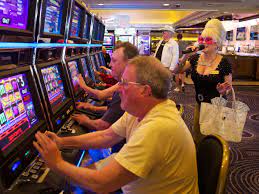Casinos have long captured the imagination of people around the world. From the lavish halls of Monte Carlo to the neon-lit streets of Las Vegas, the allure of zeus slot is undeniable. But behind the glitz and glamour lies a rich history that dates back centuries, evolving from ancient games to the digital landscapes we know today.
Ancient Beginnings: The Birth of Gambling
The roots of gambling can be traced back to ancient civilizations. Evidence suggests that games of chance were played in China as early as 2300 BC, with rudimentary forms of dice being used. Similarly, the Egyptians, Greeks, and Romans all had their own versions of gambling. These early games were often tied to religious or ritualistic practices, with people believing that the outcome was influenced by the gods.
In Europe, the Middle Ages saw the rise of card games, which were initially played by the nobility. The first recorded gambling house was established in Venice in 1638, known as the Ridotto, where patrons could engage in various games. This marked the beginning of formalized gambling, setting the stage for the casinos we know today.
The Golden Age: Casinos in the 19th and 20th Centuries
The 19th century witnessed the rise of some of the most iconic casinos in the world. The Monte Carlo Casino, opened in 1863, became a symbol of wealth and luxury, attracting the European elite. During this period, casinos were not just places to gamble but also social hubs where people would gather for entertainment and leisure.
Across the Atlantic, the United States was also experiencing a gambling boom. Riverboat casinos on the Mississippi River became popular in the 1800s, offering games like poker and blackjack. However, it was the advent of Las Vegas in the 20th century that truly transformed the casino industry.
Las Vegas, once a sleepy desert town, became a mecca for gamblers with the legalization of gambling in Nevada in 1931. The city’s casinos, like the Flamingo and the Sands, became synonymous with entertainment, attracting visitors with their luxurious hotels, world-class shows, and, of course, the chance to strike it rich. The Las Vegas Strip, with its dazzling lights and opulent resorts, became an icon of the casino industry, setting the standard for casinos worldwide.
The Digital Revolution: Online Casinos and Beyond
The late 20th and early 21st centuries brought about a seismic shift in the casino industry with the advent of the internet. Online casinos emerged in the mid-1990s, offering a new way for people to gamble from the comfort of their homes. These digital platforms replicated the experience of traditional casinos, complete with a wide variety of games, from slots to poker to roulette.
The convenience and accessibility of online casinos led to their rapid growth, with millions of people worldwide participating in virtual gambling. The rise of mobile technology further fueled this trend, allowing players to gamble on their smartphones and tablets. Today, online casinos are a multi-billion-dollar industry, with countless platforms catering to a global audience.


